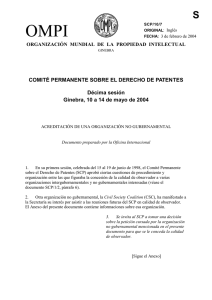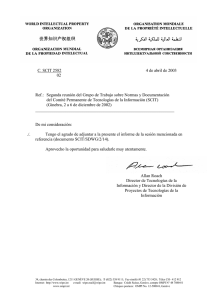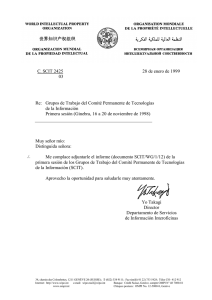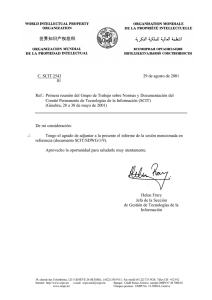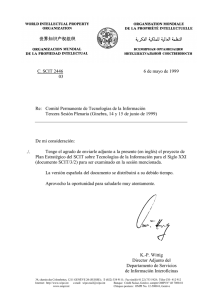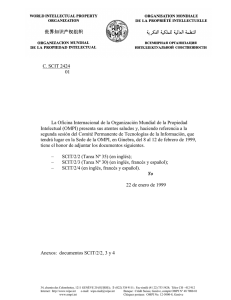scit 8 8
Anuncio
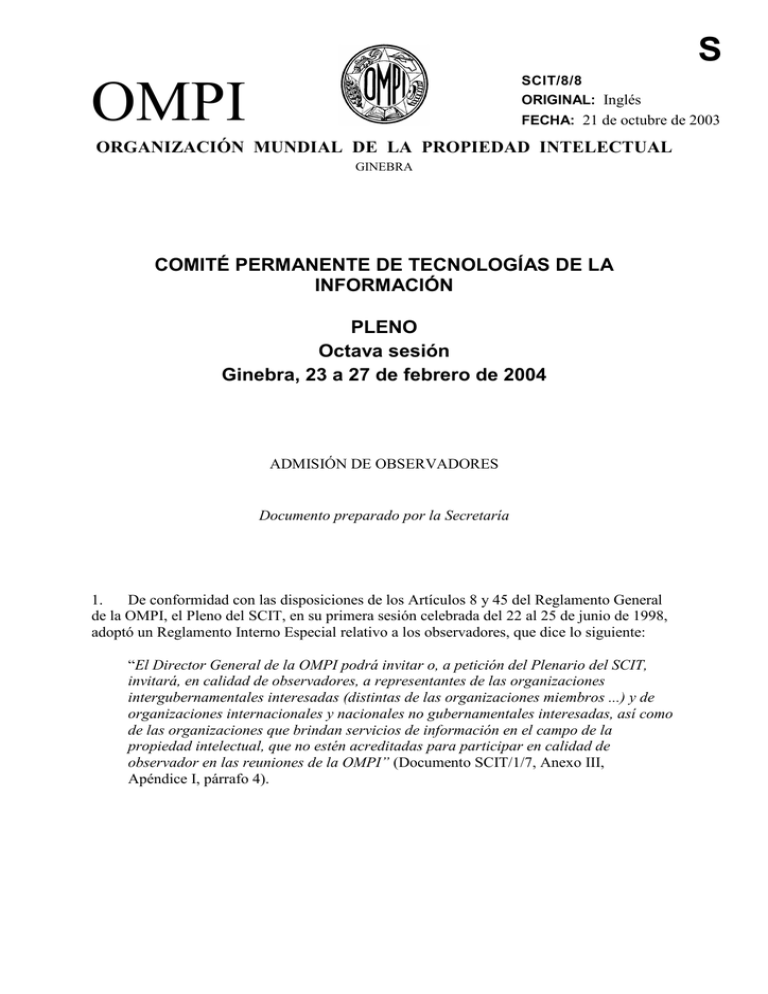
S SCIT/8/8 ORIGINAL: Inglés OMPI FECHA: 21 de octubre de 2003 ORGANIZACIÓN MUNDIAL DE LA PROPIEDAD INTELECTUAL GINEBRA COMITÉ PERMANENTE DE TECNOLOGÍAS DE LA INFORMACIÓN PLENO Octava sesión Ginebra, 23 a 27 de febrero de 2004 ADMISIÓN DE OBSERVADORES Documento preparado por la Secretaría 1. De conformidad con las disposiciones de los Artículos 8 y 45 del Reglamento General de la OMPI, el Pleno del SCIT, en su primera sesión celebrada del 22 al 25 de junio de 1998, adoptó un Reglamento Interno Especial relativo a los observadores, que dice lo siguiente: “El Director General de la OMPI podrá invitar o, a petición del Plenario del SCIT, invitará, en calidad de observadores, a representantes de las organizaciones intergubernamentales interesadas (distintas de las organizaciones miembros ...) y de organizaciones internacionales y nacionales no gubernamentales interesadas, así como de las organizaciones que brindan servicios de información en el campo de la propiedad intelectual, que no estén acreditadas para participar en calidad de observador en las reuniones de la OMPI” (Documento SCIT/1/7, Anexo III, Apéndice I, párrafo 4). SCIT/8/8 página 2 2. Una organización no gubernamental, la Civil Society Coalition, que aún no ha participado en ninguna de las reuniones anteriores del SCIT, pidió a la Secretaría, por carta de fecha 25 de agosto de 2003, que se la admitiera en calidad de observador ad hoc para participar en la octava sesión y en las futuras sesiones del SCIT. La información concerniente a la mencionada organización, que ésta envió directamente, figura en el Anexo del presente documento. 3. Se invita al Pleno del SCIT a tomar una decisión sobre la participación de la Civil Society Coalition en calidad de observador ad hoc en sus reuniones. [Sigue el Anexo] SCIT/8/8 ANEXO [Traducción de la Oficina Internacional de una carta con fecha 25 de agosto de 2003] Enviada por: Dr. Manon A. Ress Secretaría Coalición de la Sociedad Civil Al: Sra. Helen Frary Organización Mundial de la Propiedad Intelectual Por la presente, la Civil Society Coalition (CSC) solicita su admisión en calidad de observador a las sesiones del Comité Permanente de Tecnologías en la Información (SCIT) de la OMPI. Tenemos entendido que la próxima sesión del Pleno del SCIT está prevista para celebrarse a finales de febrero de 2004 y algunos miembros de nuestra organización desearían participar en ella. La Civil Society Coalition se creó en julio de 2001 con objeto de facilitar la mayor participación de la ciudadanía y de la sociedad civil en el comercio mundial y los órganos normativos y, en particular, para intensificar la participación de grupos interesados que representan los intereses de los consumidores (incluidos los que se ocupan de la salud pública o de la protección de las libertades personales). En 2001, la CSC obtuvo acreditación para asistir a la Reunión Ministerial de la OMC en Doha. Más recientemente, la CSC ha solicitado acreditación a la OMPI para participar en las reuniones del Comité Asesor sobre Observancia (ACE) y goza de la condición de observador en el Comité Permanente de Derecho de Autor y Derechos Conexos (SCCR). La CSC es una federación de varias ONG diferentes en cuanto a sus dimensiones e intereses. Desde el verano pasado, los miembros de la CSC trabajan en distintas sedes situadas en más de 12 países desarrollados y en desarrollo, y los diferentes grupos evolucionan en ámbitos tales como la salud pública, la agricultura, la elaboración de programas informáticos gratuitos, las marcas y los nombres de dominio, la política en materia de derecho de autor, la protección de los elementos de las bases de datos no amparados por el derecho de autor, y el programa de la OMPI relacionado con la protección de los conocimientos tradicionales, el folclore y el acceso a los recursos genéticos. Si bien la CSC es una organización relativamente reciente, muchos de sus miembros son bastante conocidos por su participación en la formulación de políticas sobre propiedad intelectual a nivel mundial. Varios miembros de la CSC han participado en distintas conferencias diplomáticas, reuniones de expertos o comités permanentes o especiales de la OMPI, así como en eventos relacionados con la Organización Mundial del Comercio, la Organización Mundial de la Salud, la Conferencia de La Haya u organismos comerciales regionales. SCIT/8/8 Anexo, página 2 Uno de los objetivos de la CSC es intensificar la participación de la sociedad civil en las actividades de la OMPI y, en particular, fomentar una participación más activa de los consumidores y de la ciudadanía. Nos felicitamos de que la OMPI esté dispuesta a permitir que las ONG participen en sus reuniones y lo que pretendemos es procurar que la participación de las ONG en la OMPI sea equilibrada y que también estén representados los intereses de los consumidores y de los titulares de derechos. En efecto, la CSC desearía que aumentara la participación de los consumidores, grupo actualmente no suficientemente representado en la OMPI. Muchos de los miembros de la CSC realizan actividades de defensa de los intereses de los pobres, los consumidores o los ciudadanos en general. Un objetivo importante de la CSC es brindar una oportunidad constructiva a estos grupos para que puedan participar en los debates, generalmente de alto nivel, sobre la política relacionada con la propiedad intelectual. Consideramos que los miembros de la CSC han demostrado que pueden aportar en la OMPI el tipo de contribución innovadora que haga posible una mejor formulación de políticas. He aquí algunos ejemplos de la participación de la CSC en eventos de la OMPI: • • • • • • Petición a la OMPI, en julio de 2003, para que convoque una reunión en la que se estudien nuevos modelos de colaboración para la creación de bienes públicos, petición apoyada por más de 60 expertos de alto nivel en los ámbitos de la economía, el derecho, la informática y la salud pública. (http://www.cptech.org/ip/wipo/kamil-idris7july2003.pdf) Participación en la Conferencia Diplomática de la OMPI de 1996 sobre el Programa Digital Formulación de comentarios sobre la Política Uniforme de solución de controversias en materia de nombres de dominio de Internet (Política Uniforme) Presentación de comentarios en torno al Tratado sobre el Derecho Sustantivo de Patentes Presentación de comentarios sobre la propuesta de tratado relacionado con la radiodifusión/la difusión por cable/la difusión por Internet Participación en las reuniones sobre la protección de los conocimientos tradicionales, el folclore y el acceso a los recursos genéticos. Consideramos que una mayor participación de los miembros de la CSC en los eventos organizados por la OMPI contribuirá a que el público entienda mejor las actividades de la OMPI que son complejas y a veces incomprendidas. SCIT/8/8 Anexo, página 3 Estamos dispuestos a proporcionar más información sobre la CSC. Anexos1 Miembros de la CSC Estatutos de la CSC (Firmado) [Fin del Anexo y del documento] 1 Los Anexos figuran en la página del SCIT del sitio Web de la OMPI en www.wipo.int. Attachment 1 Page 1 Profile of CSC members The membership of CSC presently includes the following groups headquartered in the following countries: Accion Internacional para la Salud Bolivia (Bolivia), Act Up Paris (France), Act Up Philadelphia (USA), Africa-Europe Faith and Justice Network (Belgium), AIDS India Forum (India), the Center for Study of Global, Trade System and Development (India), Consumers International Asia Pacific Office (Malaysia), CODEDCO Bolivia (Bolivian Committee for Consumer's Rights Protection), Consumer Project on Technology (USA), Digital Future Coalition (USA), Drug Study Group (Thailand), Educ Actions (Cameroon), Essential Action (USA), Focal Point AFRI-Tan in Central Africa (Cameroon), Free Software Foundation (USA), FUNAVI (Bolivian Foundation for Nature and Life), Global Network for People Living with HIV/AIDS (the Netherlands), Health gap (USA), Human Cooperation Centre in Bangladesh (Bangladesh), International Center for Technology Assessment (USA), National Working Group on Patent Laws (India), Technology Aid Center (South Africa), Treatment Action Group (USA), and VOICE (Ireland) Accion Internacional para la Salud (Bolivia) AIS/HAI serves as the Latin America arm of the Health Action International network, and has been active in monitoring issues relating to access to medicine and patent policy since 1996. HAI has been active in discussions over patent provisions of the proposed Free Trade Area of the Americas (FTAA), various World Health Organization resolutions on trade and public health, and the WTO negotiations on TRIPS and public health. Contact: Dr. Oscar Lanza V., Coordinator P.O.Box 568 Av. Iturralde 1178, Miraflores La Paz, Bolivia telefax: 591 2 222987 mailto:[email protected] Dr. Oscal Lanza also serves as contact for two Bolivia organizations, the CODEDCO Bolivia (Bolivian Committee for Consumer's Rights Protection) and FUNAVI (Bolivian Foundation for Nature and Life) Act UP Paris (France) Act UP Paris is a French association fighting AIDS, originating from the Gay and Lesbian community, and created in 1989. The Act Up Paris North/South Committee has been working for some time on the problem of access to AIDS treatments in the countries of the South, including issues concerning intellectual property protection. Act Up Paris has closely monitored WTO TRIPS negotiations, and regional and bilateral trade agreements, and has monitored WIPO technical assistance programs. 1 Attachment 1 Page 2 Contact: Khalil Elouardighi <[email protected]> +33.1.4929.4475 http://www.actupparis.org/ Act Up Philadelphia (USA) Act Up Philadelphia is an all-volunteer organization, committed to democratic process, self-education, and the empowerment of people living with HIV to take charge of their own lives and health. Act Up Philadelphia has closely monitored trade provisions that will affect access to medicines. Contact: Paul Davis or Asia Russell Post Office Box 22439 Land Title Station Philadelphia, PA 19110-2439 Telephone 215.731.1844 Fax 215.731.1845 http://www.critpath.org/actup/ Africa-Europe Faith and Justice Network (Belgium) AEFJN is currently has 38 member congregations, whose members who live and work in every country of Africa and Europe. AEFJN's work covers a number of trade, development, and humanitarian areas. Over the past three years, AEFJN has addressed intellectual property issues that relate to medicines, and Access and use of traditional knowledge and biological resources and seeds for smallholder farmers. One publication by the AEFJNM is Equitable Protection For Intellectual Property In Africa: the African Model Legislation for the Protection of the Rights of Local Communities, Farmers and Breeders and for the Regulation of Access to Biological Resources. Contact: Begona Inarra 174, rue Joseph II B-1000 Bruxelles - Belgique Tel. 32-2 234 68 10 Fax 32-2 231 1413 http://www.aefjn.org 2 Attachment 1 Page 3 AIDS - India E-forum (India) The AIDS-INDIA electronic forum fosters communication and collaboration among those of who are involved or interested in AIDS related issues in India. The message archives can be accessed at: http://groups.yahoo.com/group/aids-india/messages. Contact: Joe Thomas [email protected] http://groups.yahoo.com/group/AIDS-INDIA/ http://www.saathii.org/subscribe/aids_india.html Consumers International: Asia Pacific Office (Malaysia) Founded in 1960, Consumers International (CI) supports, links and represents consumer groups and consumer protection agencies all over the world through its three regional offices in Malaysia, Chile and Zimbabwe and a fourth, together with the Head Office in London. CI has a membership of 263 organisations in 119 countries. It strives to promote a fairer society through defending the rights of all consumers, including poor, marginalised and disadvantaged people, by: "supporting and strengthening member organisations and the consumer movement in general, and" campaigning at the international level for policies with respect to consumer concerns. Consumers International Regional Office for Asia and the Pacific (CI ROAP) CI ROAP was established in 1974 as the first of Consumers International's regional offices. It was situated for a brief time in Singapore, then in Penang and since July 2000 in Kuala Lumpur, Malaysia. The office provides support and services to some 77 non-profit consumer organisations and government affiliates, in 22 countries and territories of the Asia Pacific region. Since its inception, ROAP has carried out a range of activities on diverse issues. These activities have evolved throughout the years to meet changing needs. Ongoing programme areas include projects on health and pharmaceuticals, food security and safety, trade and economics, consumer protection and law, sustainable consumption and consumer education. Contact: Rajeswari Kanniah, Assistant Director [email protected] 5-1 Wisma WIM 7 Jalan Abang Haji Openg, TTDI 60000 Kuala Lumpur Malaysia Tel: 603-77261599 Fax: 603-77268599 3 Attachment 1 Page 4 Consumer Project on Technology (USA) CPTech is a US based NGO that focuses on information and health care technologies, with an emphasis on intellectual property rules. In 1996 CPTech attended the WIPO diplomatic conference on the Digital Agenda. CPTech has provided comments to WIPO on the rules for protection of trademarks in domain names. In January 2001, CPTech was invited to present at a meeting on jurisdiction and intellectual property that was co-sponsored by WIPO and the Hague Conference on Private International Law. In 2002 CPTech co-organized a meeting in Geneva on focusing on technical assistance as it relates to access to medicines. Over the past two years CPTech has provided comments to WIPO on the proposed substantive patent law treaty and also a proposed broadcast/cablecast/webcasting treaty. CPTech was recently credentialed in the WIPO intergovernmental committee on intellectual property and genetic resources, traditional knowledge and folklore, and has sought to participate in the WIPO Advisor Committee on Enforcement and the Standing Committee on Copyright as a member of the CSC. CPTech also has extensive experience in intellectual property matters in a number of other fora, much of which is detailed on CPTech web page. Contact: Joy Spencer Consumer Project on Technology PO Box 19367 Washington, DC 20036 tel.:1 202 387 8030 fax: 1 202 234 5176 [email protected] http://www.cptech.org. Digital Future Coalition (USA) The Digital Future Coalition (DFC) is committed to striking an appropriate balance in law and public policy between protecting intellectual property and affording public access to it. Based in the United States, the DFC is the result of a unique collaboration of many of leading non-profit educational, scholarly, library, and consumer groups, together with major commercial trade associations representing leaders in the consumer electronics, telecommunications, computer, and network access industries. Since its inception, the DFC has played a major role -- domestically and internationally -- in the ongoing debate regarding the appropriate application of intellectual property law to the emerging digital network environment. One of DFC's first activities was to respond to the 1996 WIPO diplomatic convention on the digital agenda. 4 Attachment 1 Page 5 Contact: Peter Jaszi Digital Future Coalition 1341 G Street NW, Suite 200 Washington, DC 20005 tel. 202.628.9210 email: [email protected] http://www.dfc.org/ Drug Study Group (Thailand) The Drug Study Group is well known internationally for its work to overcome intellectual property barriers to improve access to medicines. A 1998 campaign by the Drug Study Group and other Thai NGOs lead to removal of market exclusivity for fluconazole in Thailand, leading to price reductions of 95 percent and greatly expanded access to treatment for cryptococcal meningitis and ADIS related thrush. The Drug Study Group has also been active in efforts to overcome dubious patents on AIDS drugs and to obtain compulsory licensing of patents on essential medicines. Contact: Jiraporn Limpananont, Ph.D. Faculty of Pharmaceutical Sciences, Chulalongkorn University, Bangkok 10330, Thailand [email protected] EDUC Actions (Cameroon) EDUC Actions is a Cameroon NGO that is involved a number of different issues including those relating to the use of traditional medicines, WTO rules on patents and medicines, and women's health. Contact: Elvire Beleoken, President B.P. 5515 Yaounde (Cameroon) Tel : (237) 22 98 37 Email : [email protected] [email protected] 5 Attachment 1 Page 6 Essential Action (USA) Essential Action is a USA based NGO that has projects on such topics as global tobacco control, the dumping of obsolete incinerators in the developing world, Shell's environmental record in Nigeria, and corporate wrongdoing. Essential Action is also active in issues concerning intellectual property, trade agreements and access to medicines. Contact: Robert Weissman PO Box 19405 Washington, DC 20036 USA tel.: 1 202 387 8030 fax: 1 202 234 5176 [email protected] http://www.essentialaction.org. Focal Point / AFRi-Tan in Central Africa (Cameroon) Focal Point is active in a number of environmental, health and development projects. Afri-TAN is the African TRIPS Action Network. Both groups are interested in access to health care and the patenting of seeds. Contact: Ngo Louga Madeleine Focal Point BP 875 Yaounde-Cameroon E-mail: [email protected] Free Software Foundation (USA) The Free Software Foundation (FSF). is the principal organizational sponsor of the GNU Project. The GNU Project was launched in 1984 to develop a complete Unixlike operating system which is free software: the GNU system. (GNU is a recursive acronym for ``GNU's Not Unix''; it is pronounced "guh-NEW".) Variants of the GNU operating system, which use the kernel Linux, are now widely used; though these systems are often referred to as ``Linux'', they are more accurately called GNU/Linux systems. The FSF has a longstanding interesting in protecting its members freedom to write software, and has objected to efforts to extent patent protection to software. 6 Attachment 1 Page 7 Contact: Richard Stallman 545 Tech Sq rm 425 Cambridge MA 02139 USA [email protected] http:/www.gnu.org Global Network for people living with HIV/AIDS (the Netherlands) GNP+ has a central secretariat in Amsterdam, but works in the 5 regions as defined by the World Health Organization (WHO) Africa, Asia/Pacific, Europe, Latin America/Caribbean and North America. The overall aim of GNP+ is to improve the quality of life of people living with HIV/AIDS. Contact: P.O.Box 11726, 1001 GS, Amsterdam The Netherlands Tel : 31 20 689 8218 Fax: 31 20 689 8059 http://www.xs4all.nl/~gnp Health Gap (USA) The Health GAP Coalition was started by Alan Berkman, M.D., a New York physician who treats low-income persons with AIDS, with help from members of ACT UP/New York, ACT UP/Philadelphia, Search for a Cure, AIDS Treatment News, AIDS Treatment Data Network and many others. Contact: Sharonann Lynch [email protected] Tel : +1 212 674-9598 http://www.healthgap.org Human Cooperation Centre in Bangladesh (Bangladesh) The HCCB is a development group that works on a variety of projects, including those involving agriculture and sustainable development. 7 Attachment 1 Page 8 Contact: James B. Sarker Executive Director 4B/B, 2nd Colony, Mazer Road Mirpur-1, Dhaka-1216 Bangladesh INTERSECT (USA) INTERSECT organizes coalitions of organizations within and from separate movements which share common agendas, needs & visions. The first project explored the relationship between HIV and Violence Against Women. Contact: Sally Fisher Intersect 77 West 15th Street, Suite 6L New York, New York 10011 USA Phone: 1 212 989 9388 Fax: 1 212 989 9394 International Center for Technology Assessment (USA) The International Center for Technology Assessment (CTA) is a non-profit organization committed to providing the public with full assessments and analyses of technological impacts on society. ICTA's work includes the Patent Watch Project, which has reviewed bio-prospecting in Yellowstone Park, opposed the patenting of clones of human fetuses and embryos, and opposes the patenting of plants already protected under sui generis IP regimes. Contact: Peter T. DiMauro International Center for Technology Assessment 666 Pennsylvania Ave. SE, Suite 302 Washington, DC 20003 USA 1 202-547-9359 (phone) 1 202-547-9429 (fax) [email protected] (email) http://www.icta.org/index.htm 8 Attachment 1 Page 9 National Working Group on Patent Laws (India) The National Working Group on Patent Laws (NWGPL) has carried out a number of studies on the implications and impact of amendments to the India Patents Act, 1970, particularly as it relates to issues of public health and the role, vitality and growth of the Indian pharmaceutical, agriculture, chemical and bio-technology industries. One of its recent projects is the creation of a Peoples’ Commission of eminent persons to examine changes in the India patent law. This Commission includes such individuals as Prof. Yashpal, the Former Chairman of the University Grants Commission of India, Shri. B.L. Das, a former Ambassador to GATT, and Former Director, International Trade Programmes for UNCTAD, Dr. Yusuf Hamied, the Chairman & Managing Director, Cipla Limited, and Dr. Rajeev Dhavan, a Senior Advocate for the Supreme Court of India. Contact: B.K. Keayla The National Working Group on Patent Laws A - 388, Sarita Vihar, New Delhi - 110 044, India B.K. Keayla [email protected] Centre for Study of Global Trade System and Development (India) Contact: B.K. Keayla A - 388, Sarita Vihar, New Delhi - 110 044, India B.K. Keayla [email protected] Technology Aid Center (Ghana) TAC seeks to promote technological literacy in Ghana, to provide technical consultancy services to schools and organizations in their technology development efforts, and to liaise with relevant public and private organizations and collaborating NGOs to address technology development issues. 9 Attachment 1 Page 10 Contact: Peter Kenyenso President [email protected] [email protected] Phone / 233-21-239545 / 233-27-537266 http://www.tac-ch.org. Treatment Action Group (USA) Founded in January, 1992, the Treatment Action Group, or TAG, is the first and only AIDS organization dedicated solely to advocating for larger and more efficient research efforts, both public and private, towards finding a cure for AIDS. The Treatment Action Group (TAG) fights to find a cure for AIDS and to ensure that all people living with HIV receive the necessary treatment, care, and information they need to save their lives. TAG focuses on the AIDS research effort, both public and private, the drug development process, and our nation's health care delivery systems. Contact: Mark Harrington Treatment Action Group 611 Broadway, Ste. 612 New York, NY 10012 (212) 253-7922 phone (212) 253-7923 fax [email protected] http://www.treatmentactiongroup.org Voice of Irish Concern for the Environment (Ireland) VOICE promotes a respectful relationship with the Earth and positive solutions to environmental destruction. We encourage a way of life that is in harmony with nature rather than in conflict with it. In co-operation with local, national and international organisations VOICE works to increase environmental awareness through education, empower people to protect our environment and campaign on national environmental policy. Contact: Ruth McGrath 7 Upper Camden St. Dublin 2 Ireland 353 1 6618123 353 2 6618114 mailto:[email protected] web: http://www.voice.buz.org 10 Página 1 Nombre de la organización: Civil Society Coalition Estatutos 1. Admisión. 1.1 Solicitudes: Podrá solicitar la admisión a la CSC toda organización no gubernamental sin fines de lucro. 1.2 Examen de las solicitudes. La Secretaría examinará las solicitudes y efectuará el aviso correspondiente a la lista de anuncios de la CSC y al Comité de Dirección de la CSC. 1.3 Decisiones sobre las solicitudes de admisión. El Comité de Dirección determinará entonces si se acepta o no la solicitud de admisión a la CSC. 1.4 Factores en el examen de las solicitudes. Los miembros deben contar con una trayectoria de promoción de los intereses de la ciudadanía o del consumidor en los órganos comerciales y normativos. 1.5 Decisión sobre las nuevas solicitudes. El comité de dirección decidirá si se aceptan o rechazan las solicitudes de admisión, después de seguir los procedimientos para el examen de las solicitudes. La decisión del comité de dirección será definitiva. 2. Comité de Dirección. 2.1 Tamaño del Comité de Dirección. El tamaño inicial del Comité de Dirección será de 5 personas. 2.2 Elecciones. Las elecciones al Comité de Dirección se celebrarán cada mes de enero. Cualquier miembro podrá proponer a alguien para el comité de dirección. Las elecciones serán administradas por la Secretaría. 3. Secretaría. Página 2 El Comité de Dirección nombrará a una secretaría para que administre los asuntos de la CSC. 4. Representación ante órganos comerciales y normativos. 4.1. Acreditación. La Secretaría preparará solicitudes para la acreditación y representación ante los órganos comerciales y normativos internacionales correspondientes, que incluyen sin carácter limitativo: Organización Mundial de la Propiedad Intelectual (OMPI) Organización Mundial del Comercio (OMC) Organización Mundial de la Salud (OMS) Conferencia de La Haya sobre el Derecho Internacional Privado Conferencia de las Naciones Unidas sobre el Derecho Internacional del Comercio Organización para la Cooperación y Desarrollo Económicos (OCDE) G8 4.2 Representación. A los miembros de la CSC se los mantendrá informados de las oportunidades de participar en los órganos comerciales y normativos. La Secretaría decidirá las personas que representarán a la CSC en tales encuentros, así como el cometido de dicha representación. 5. Declaraciones de política. En la mayoría de los casos, la CSC facilitará la participación de la sociedad civil en reuniones de órganos comerciales y normativos, pero sin apoyar ni expresar opiniones sobre cuestiones de fondo. Sin embargo, en algunos casos la CSC permitirá que se presenten declaraciones en nombre de la CSC o en nombre de algunos de los miembros de la CSC. A continuación se presentan los procedimientos correspondientes: 5.1 Las declaraciones que se presenten en nombre de la CSC deben ser primero informadas a los miembros por la lista de anuncios y luego aprobadas por el Comité de Dirección. Se permite que los afiliados adviertan su abstención u oposición a las declaraciones de política. En dichas declaraciones debe figurar un aviso de que los miembros particulares de la CSC no están necesariamente de acuerdo con la postura de la CSC. 5.2 Asimismo, la CSC podrá, dadas las circunstancias indicadas, presentar declaraciones respaldadas por miembros particulares de la CSC. Página 3 6. Finanzas. Todos los gastos de la CSC serán donados por sus miembros a discreción de éstos. 7. Listas de distribución. La CSC mantendrá una lista de debate archivada y abierta al público, y una lista de anuncios accessible solamente a los miembros. 8. Modificaciones a los estatutos. El Comité de Dirección podrá modificar los estatutos, previo aviso a los afiliados por la lista de anuncios.
